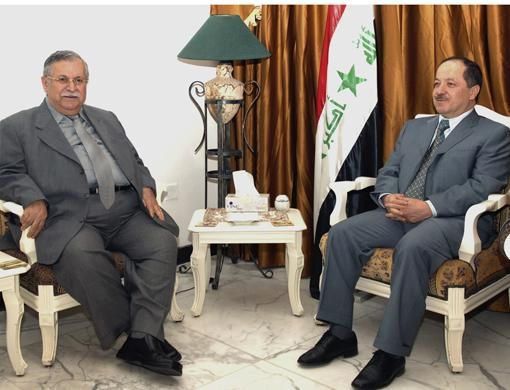Baghdad: Sunni politicians maintained a hard line on Monday after Iraq's Prime Minister Nouri Al Maliki invited key Sunni and Kurdish allies to a crisis conference in a desperate bid to reach a compromise among Iraq's divided factions.
It was a limited invite, including President Jalal Talabani, a Kurd, Vice President Tariq Al Hashemi, a moderate Sunni, Vice President Adel Abdul-Mahdi, a Shiite, and Massoud Barzani, the leader of the autonomous Kurdish region in northern Iraq.
Abdul-Mahdi's office said he and Barzani would attend. Al Hashemi's office said it planned to give its answer later on Monday.
But Iraq's minority Sunnis expressed growing anger over their perceptions of Al Maliki as a deeply biased sectarian leader with links to Iran and his failure to bring all sides together after taking office in May 2006 and promising a national unity government.
"It is one year and 4 months now that he has been in office and he is still leading a one-man rule and a sectarian policy," said Hamid Al Mutlaq, a senior member of the the National Dialogue Front, a Sunni Arab political party. "The country is on the verge of collapse."
"Is he going to give a cure after all this destruction? He has proved that he is a sectarian leader and a failure, the country is under the control of criminal gangs with the
complete absence of an authority or government."
His sharp words came a day after Iraq's most senior Sunni politician, Adnan Al Dulaimi, issued a desperate appeal for Arab nations to help stop what he called an "unprecedented
genocide campaign" by Shiite militias armed, trained and controlled by Iran.
Al Maliki called for the meeting during a news conference on Sunday and said he hoped it could take place in the next two days as he faces growing impatience with his government's perceived Shiite bias and failure to achieve reconciliation or to stop the sectarian violence threatening to tear the country apart.
The prime minister also threatened to isolate the political blocs who have boycotted his Cabinet, suggesting they could be replaced by local Sunni tribal leaders who have recently formed alliances and joined US-led efforts against Al Qaida in Iraq.
"We hope to end this crisis and that the ministers will return," Al Maliki said. "But if that doesn't happen, we will go to our brothers who are offering their help and we will choose ministers from among them."













